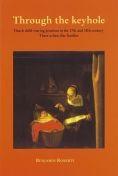- Nederlands
- English
Through the Keyhole

Foreigners in the United Provinces have always complained that Dutch parents are too indulgent for their children. Dutch schoolmasters also confirmed this image. But was the Republic of the Netherlands in the seventeenth and eighteenth centuries a children's paradise in Early Modern Europe? Through the keyhole focuses on childhood and childrearing as represented in the correspondence of three urban-elite families over the course of four generations: the De la Courts (Leiden), the Huijdecopers (Amsterdam) and the Van der Muelens (Utrecht).
These families, which started out as modest tradesmen and manufacturers, became wealthy during the economic boom in the early seventeenth century. In this period of flexible social mobility, their newly-acquired wealth - as well as their Protestant denomination - gave them access to political positions in the town councils of the new republic. At home these urban elite shed their political attire and donned parental robes.
Their correspondence unveils the many concerns of parents in the Early Modern era (including infant feeding, childhood illnesses, schooling for girls, affection in the parent-child relationship and moral guidance for adolescents), which have been watershed issues for family historians including Philippe Aries, Lawrence Stone, Linda Pollock and Steven Ozment. These intimate matters are observed as if looking through a keyhole, and are adressed within the realm of general pedagogical practices in the Dutch Republic in the seventeenth and eighteenth centuries.